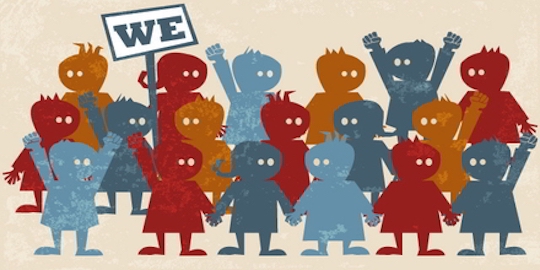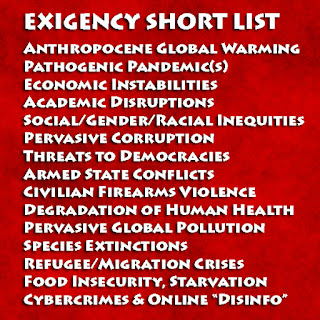An update.
Three years ago AAAS published an article entitled "The crisis of democracy and the science of deliberation."
The "crisis" continues. As to "deliberation science," my dubiety remains. Google search the phrase and the top results remain the 2019 AAAS article.
apropos, read an interesting essay in my new Harper's Magazine today.
Modern democracies are facing a deep cognitive crisis. For many years now, societies have been living with moral relativism, which asserts the essential subjectivity of all value systems. Liberalism was founded on the premise that people disagree on the final ends of life or understandings of the good. Postmodernism, however, has moved us further, from moral to cognitive relativism, in which even factual observation is regarded as subjective."At the heart of the liberal project lies the assumption that if you strip away the customs and accumulated cultural baggage that each of us carries, you’ll find an underlying moral core that we all share and can recognize in one another. It is this mutual recognition that makes democratic deliberation."
The journalist Jonathan Rauch notes that the approach to factual truth coming out of the liberal Enlightenment rests on trust in a social system that adheres to two rules: that no one gets the final say, and that knowledge must be based on empirical evidence and not on the authority of the speaker. To this we need to add a battery of techniques that seek to either verify empirical propositions through inductive reasoning or falsify them through observation. These techniques are known collectively as the scientific method, and its rise was critical to liberalism’s struggle against religion. Science was able to defeat it because it could produce repeatable results. The manipulation of nature produced the modern economic world, where continuous growth through technological advance could be taken for granted. Scientific approaches to health led to huge increases in longevity, and military technology conferred huge advantages on states that could be used to defend or conquer. Science, in other words, became strongly associated with power, perhaps exemplified by the mushroom cloud exploding over Hiroshima in August 1945.
Precisely because modern science was so intimately associated with existing power structures, it engendered a prolonged critique that questioned whether its dominance was justified. In a series of brilliant books, Michel Foucault argued that the language of modern science was used to mask the exercise of power. The definitions of mental illness, the use of incarceration to punish certain behaviors, and the medical categorizations of sexual deviancy were not based on neutral empirical observation of reality, but rather they concealed the operation of broader power structures that subordinated and controlled different classes of people. The supposedly objective language of science encoded these interests in ways that hid the influence of power holders; people were thereby unconsciously manipulated into affirming the dominance of certain ideas and the groups that stood behind them.
With Foucault, deconstructionism evolved into postmodernism, a more general critique of the cognitive modes that had been strongly associated with classical liberalism for centuries. This critique was easily incorporated into the varieties of critical theory that proliferated in the United States from the Eighties onward, and were used to attack the racial and gendered power structures of the time.
At the heart of the liberal project lies the assumption that if you strip away the customs and accumulated cultural baggage that each of us carries, you’ll find an underlying moral core that we all share and can recognize in one another. It is this mutual recognition that makes democratic deliberation. But this idea has come under attack with the growing awareness of identity’s complexities. Individuals are not the autonomous agents of liberal theory; they are shaped by broader social forces over which they have no control. Knowing is not an abstract cognitive act, but is intimately bound up with doing, acting, and being acted on. It is impossible to reject many of these ideas, because they begin from observations that are indubitably true.
The whole enterprise of neoclassical economics has presented itself as a neutral application of the scientific method to the study of economics. Among social scientists, economists have gone the farthest in trying to formalize their theories with abstract mathematical models, and in developing a rigorous empirical methodology to validate them with. But this did not prevent them from falling prey to the attractions of power and money. Deregulation, privatization, and a strict defense of property rights were pushed by wealthy corporations and individuals, who created think tanks and hired big-name economists to write academic papers justifying policies that were in their private interests.
Many criticisms of modern natural science and the cognitive approaches associated with classical liberalism were therefore justified. But some critical theorists went beyond attacks on specific misapplications of the scientific method, to a broader critique of science as it had evolved since the Enlightenment. They argued that the search for human universals fundamental to liberalism was simply an exercise in power, one that sought to impose the ideas of a single civilization on the rest of the world…
—Mistaking Identity. by Francis Fukuyama
U.S. Democracy appears to be at significant, increasing risk of late.
Erratum:
“Experts need to remember, always, that they are the servants and not the masters of a democratic society and a republican government. If citizens, however, are to be the masters, they must equip themselves not just with education, but with the kind of civic virtue that keeps them involved in the running of their own country.” —Tom Nichols
Interesting thoughts by Russ Greene over on Medium: "John Gray in a friendly semi-debate with Francis Fukuyama. To be sure, asking John Gray whether liberalism is in trouble is much like asking a chiropractor whether you need an adjustment..."
Liberalism’s Saving Grace: It Falls ShortGood writer. Clear thinker. Just got onto him today.
...The antiliberals are right to claim that liberalism falls short as a source of meaning, and an ethical system. Antiliberals are wrong, though, to insist that this fact discredits liberal government, or somehow justifies an illiberal rejection of constitutionally limited, liberal democracy. After all, liberalism is rooted in, and fosters, enduring institutions of morality and meaning that help lift our eyes above our own greed and pride…
A liberalism rooted in the insights of both David Hume and Paul of Tarsus, reason and revelation, is needed to meet the challenges of our present moment. Such liberalism may be necessary to defend the “self-evident” truths Thomas Jefferson articulated in the Declaration of Independence, the same ones that Frederick Douglass called “saving principles.”
Call it conservative liberalism. Or, perhaps, American liberalism.
OK, ONE MORE THING
__________


No comments:
Post a Comment